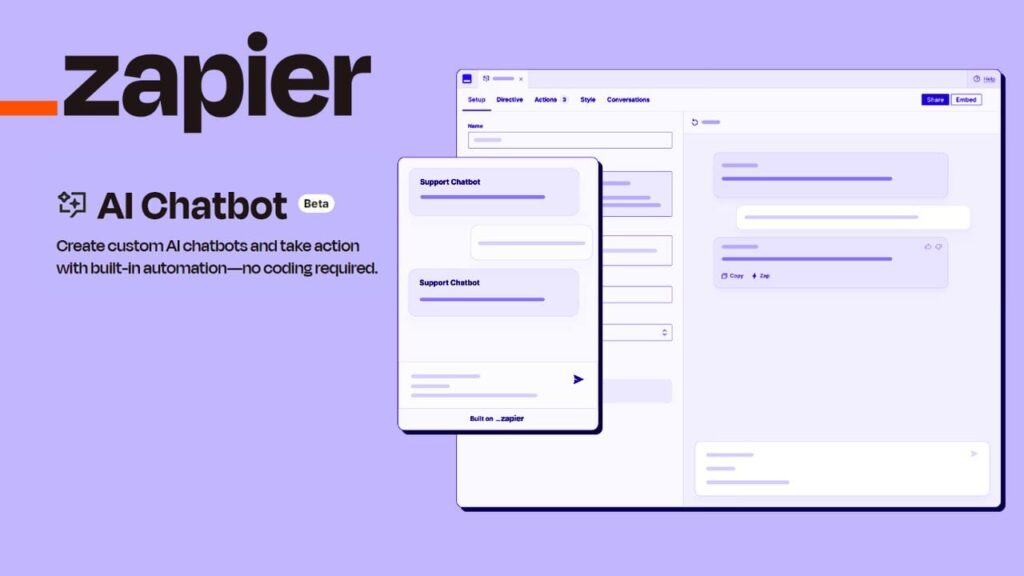The evolution of AI-driven automation platforms has become a cornerstone for small and medium-sized businesses (SMBs) aiming to enhance their operational efficiency and customer engagement. A recent upgrade to Zapier’s AI chatbot capabilities exemplifies the transformative potential of these tools. This analysis juxtaposes Zapier with its key competitors, focusing on Make, OpenAI, and Anthropic, to better understand the intricacies of AI and automation platforms in terms of strengths, weaknesses, costs, return on investment (ROI), and scalability.
Zapier’s recent enhancements feature a user-friendly interface integrated into its existing ecosystem, streamlining the creation and deployment of custom AI chatbots. This development allows companies to quickly set up chatbots that align with their branding and operational requirements. The pre-built templates save significant time, making it particularly appealing for businesses with limited resources. In contrast, Make, another automation platform, offers more robust workflow capabilities that may attract users with complex process automation needs. However, its learning curve can be steeper, potentially deterring less tech-savvy users.
From a customization standpoint, Zapier provides a level of flexibility that caters to diverse business needs while maintaining operational simplicity. It allows for branding and personalized user experiences, fostering deeper customer engagements. Although Make supports a variety of integrations and advanced functionalities, the initial setup might take longer. Businesses focused on rapid deployment may find Zapier’s offering more advantageous, while those requiring intricate workflows might lean towards Make’s capabilities.
In terms of pricing structure, Zapier has adopted a tiered approach that accommodates a variety of budgets, from free to advanced options tailored to larger organizations. This versatility makes it an attractive option for SMBs looking to scale without incurring substantial upfront costs. Advanced plans offer sophisticated AI models and enhanced data integration capabilities, contributing to improved chatbot conversation quality. Make also provides tiered pricing but may impose limitations on its free tiers that could restrict access to critical features. Assessing ROI, businesses investing in Zapier can expect substantial gains through increased efficiency and customer satisfaction.
Looking at the competitive landscape of AI-related platforms, OpenAI and Anthropic present formidable options. OpenAI, with its GPT-3.5 and beyond, offers unparalleled natural language processing capabilities, making it highly suitable for sophisticated conversational agents. However, its high operational costs can be a barrier for smaller firms. In contrast, Anthropic focuses on a more ethically aligned AI approach and has made strides in reducing the risk of AI misusage. While its conversational abilities are growing, Anthropic’s market presence is not as strong as that of OpenAI, which may lead to missed opportunities for businesses keen on leveraging the latest developments in AI.
Scalability remains a critical concern for businesses considering these platforms. Zapier is tailored for growth, easy to implement, and future-proofed through continuous upgrades, ensuring that its users stay ahead of technological advancements. In contrast, Make excels in environments where complex, multi-step workflows are the norm, which may limit its usability in rapid-growth scenarios. OpenAI’s solutions are scalable but can become cost-prohibitive at higher utilization rates, particularly for businesses scaling rapidly.
Summarizing the comparative analysis, businesses must weigh the tactical advantages of each platform. Zapier’s ease of use, customer-centric approach, and flexible pricing make it ideal for organizations prioritizing customer service improvements and operational efficiencies. Conversely, firms dealing with complicated workflows may find Make’s capabilities indispensable, albeit with a steeper learning curve. Organizations inclined towards cutting-edge natural language processing should consider OpenAI, despite its higher costs, while Anthropic represents a stable alternative for those concerned with ethical AI usage.
In conclusion, as SMB leaders and automation specialists navigate the choices in AI and automation platforms, the decision-making process should be data-informed and aligned with strategic business objectives. Evaluating current needs, anticipated growth, and resource allocation will allow companies to leverage the advantages inherent in these technologies. While the landscape is continually advancing, platforms like Zapier, Make, OpenAI, and Anthropic each offer unique benefits and challenges that can significantly impact ROI and success in today’s competitive environment.
FlowMind AI Insight: Businesses must embrace a comprehensive evaluation of AI and automation tools to maximize ROI while ensuring scalability. By aligning technology choices with strategic objectives, organizations can navigate the complexities of digital transformation effectively.
Original article: Read here
Original publication date: 2023-12-30 08:00:00

